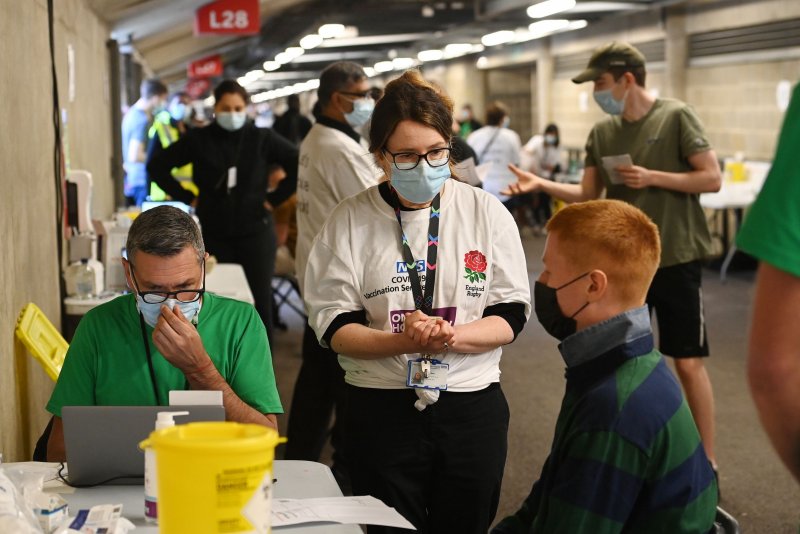
Sept. 4 (UPI) — Britain’s vaccine advisory body has recommended against universal COVID-19 vaccination for healthy children between the ages 12 of 15 despite a government push to proceed with a plan.
The Joint Committee on Vaccination and Immunization found that while the health benefits from vaccinations are “marginally greater than the potential harms,” it said in a statement Friday that “the margin of benefit is considered too small to support universal vaccination of healthy 12- to 15 year-olds at this time.”
Still, the panel added that it would advise COVID-19 vaccination for such children if they are more “at-risk” due to underlying conditions such as cancers that affect the blood, bone marrow and lymph nodes, sickle cell disease, type 1 diabetes, congenital heart disease, and other chronic conditions, with respiratory and neurological disease.
“For the vast majority of children, SARS-CoV-2 infection is asymptomatic or mildly symptomatic and will resolve without treatment,” the advisory body explained in the statement.
“Of the very few children aged 12 to 15 years who require hospitalization, the majority have underlying health conditions. The committee has recommended the expansion of the list of conditions to which the offer applies for at-risk 12- to 15-year-olds.”
British ministers have pushed for universal vaccination in recent days as most schools in England have returned this week, citing existing vaccination programs for the same age group in Israel, the United States and Germany.
And although it advised against universal vaccination for children, the advisory panel gave the government some leeway.
“It is not within the JCVI’s remit to consider the wider societal impacts of vaccination, including educational benefits,” it said. “The government may wish to seek further views on the wider societal and educational impacts from the Chief Medical Officers of the UK 4 nations.”
Health Secretary Sajid Javid and his counterparts in Scotland, Wales and Northern Ireland wrote to chief medical officers in their countries immediately after the announcement, asking them to “consider the matter from a broader perspective.”
The advice widens the existing vaccine program to include an extra 200,000 children ages 12-15 with underlying conditions.
One risk from the COVID-19 vaccination that the JCVI raised was the “extremely rare” chance of myocarditis with long-term effects unknown and follow-up research being conducted.
But University of Warwick virologist Lawrence Young told The Guardian the risk of developing myocarditis was “significantly higher for those youngsters who have contracted COVID-19 compared to those who have been vaccinated with Pfizer jab.”
“This is a very disappointing and worrying decision,” he said.
Geoff Barton, general secretary of the Association of School and College Leaders, told Sky News that the decision “would make it more difficult during the autumn term and beyond to guard against educational disruption caused by transmission of the virus.”